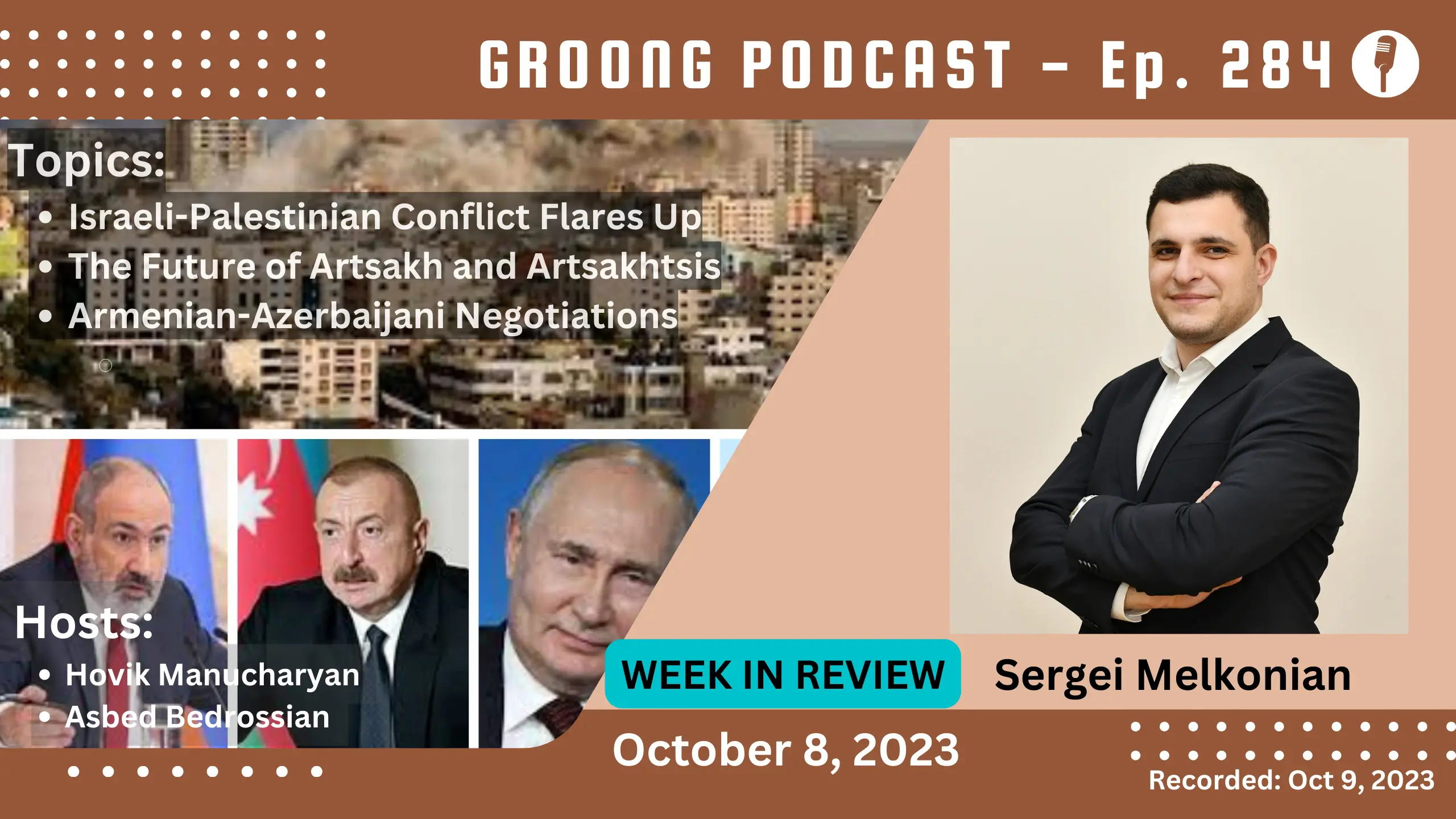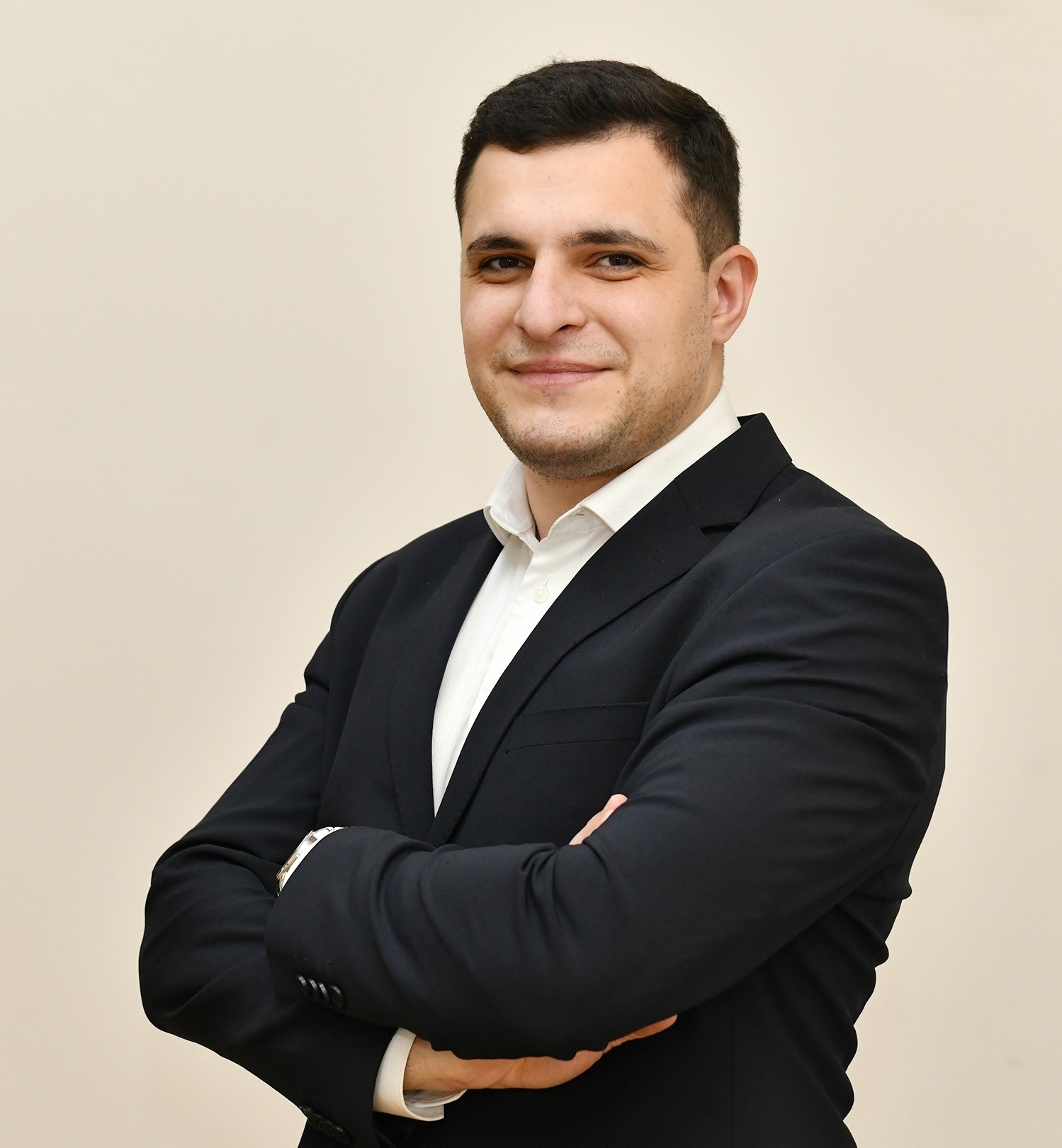
Guest:
Topics:
- Israeli-Palestinian Conflict Flares Up
- The Future of Artsakh and Artsakhtsis
- Armenian-Azerbaijani Negotiations
Episode 284 | Recorded: October 9, 2023
Show Notes
Israeli Palestinian Conflict Flares Up
On Saturday, Hamas and Israel clashed on the border of the Gaza strip. At the time of our recording, over 800 Israelis are reportedly dead, with over 2000 injured. The Palestinians report over 350 dead and over 2300 injured. It was a very uncharacteristic war, where Palestinian guerillas achieved unexpected results in their offensives, although Israel is now striking back and recovering some of the lost positions and villages.
Questions:
- What brought on this round of violence? Who started it and why?
- What dangers might this conflict bring to our region? How big is the possibility of escalation into a larger regional war involving Iran?
There are Israeli reports that they’ve apprehended Turkish supplies and logistics targeted to the Palestinians. Meanwhile the Azeris are pro-Israel.
Questions:
- How are the Turks, and by that we mean both Turkey and Azerbaijan, playing this issue?
- How should Armenia react to these affairs?
The Future of Artsakh & Artsakhtsis
Since the depopulation of Artsakh, when 100,000 Armenians were forcibly removed from their indigenous homeland, we’ve been asking our analyst this same question.
Questions:
- Is the Artsakh conflict over?
- What is the future of Artsakh?
The government of Artsakh was disbanded by president Samvel Shahramanyan, on Sep. 28.
Questions:
- Should Artsakh reconstitute as a government-in-exile?
- Would Armenia host such a government?
In the past 2 weeks over 100,000 Artsakh refugees flooded into Armenia. This is on top of the additional 40-plus thousands who were already in Armenia since the war in 2020.
Questions:
- What options do these refugees have? Can they ever return to their homeland? And should they even, at the cost of living under Azerbaijani rule, as an oppressed minority?
- What is Armenia’s perspective on these refugees? Are they being viewed purely through a humanitarian lens, or also a political lens?
- Are they being classified as refugees, or IDPs?
- Does the current government want them in Armenia, or not in Armenia?
Armenian Azerbaijani Negotiations
The Grenada meeting last week was in some ways disappointing and in other ways, even more disappointing. First, Azerbaijani president Aliyev did not show up. He wanted Turkish president Erdogan to attend his summit with Pashinyan, but European leaders rejected it, so neither Aliyev nor Erdogan showed up in Spain. Second, Aliyev’s absence did not prevent Pashinyan from signing something that he had said only verbally so far; he signed under a written statement formalizing his recognition of Azerbaijan’s sovereignty, specifying the 86,600 sq km of land area.
Immediately after the signing, Azerbaijani diplomats and media began circulating older demands that Armenia is in control of “8 villages” (referring to enclaves) which should be relinquished immediately.
Questions:
- Why did Pashinyan sign a written statement when Aliyev was not even present?
- Does Aliyev’s “boycott” mean that the risk of war is higher (because we know that Aliyev is not satisfied
Earlier you mentioned the topic of enclaves.
Questions:
- Are enclaves also included?
- Can you tell us the details on this enclave issue? What are these enclaves, where are they, and what is their significance?
- Note: even today, Armenian cartography expert Ruben Galichian has asserted that there is no legal or historical basis for the Azeri enclave demands on Armenia.
- If the enclaves are officially recognized as Azerbaijan, doesn’t this give Aliyev more pretext for another war?
- Is Pashinyan likely to compromise on the issue of enclaves?
- Note: It seems he has in at least one interview said that yes, the enclaves are part of the 86.6k sq km, but also added that Artsvashen is part of Armenia.
- Is Pashinyan likely to compromise on the issue of enclaves?
There are signs that Aliyev may be looking to move the negotiations platform away from Europe. On Sunday, Aliyev said that he would start talks in Georgia immediately, with Armenia. Additionally, today Russia has also offered to organize a meeting of the three foreign ministers in Bishkek, and possibly in collaboration with the US and the EU, saying that the Armenian Azerbaijani conflict is not resolved yet.
Russian experts are also predicting that Aliyev will try to move negotiations back to Russia, or somewhere away from the West.
Question:
- Is Aliyev trying to dump the Western platforms, and move negotiations back to Russia, or Georgia, or the 3+3?
- Should Pashinyan accept moving the negotiations back to Russia or Georgia?
- What are the pros and cons of such shuffling of the platforms at this point in time?
With the concern that Pashinyan has agreed to give away the enclaves, which will be a chokehold on Armenia’s major communication arteries, it seems that the only “red line” left for Armenia would be its sovereignty over Syunik despite the demand from Turkey and Azerbaijan of multiple passageways through Armenia’s south, or what they call the “Zangezur corridor”. Armenia has repeatedly stated that it would retain sovereignty over any such road and has accused Turkey and Azerbaijan of claiming an ex-territorial corridor. Iran has stated firmly that Armenia’s borders and any geopolitical changes are a red line for them. The nuance here is that in point 9 of the Nov 2020 statement it states: “control over transport communication shall be exercised by the Border Guard Service bodies of the FSS of Russia”, so in a sense people are arguing that Armenia already ceded sovereignty.
Questions:
- With all the remaining points of the Nov 9/10 statement being apparently moot, does it make sense for Armenia to even stay as a signatory of that statement? Could Armenia withdraw from the statement?
In the past few days, Iran stepped up its diplomatic activities around reducing tensions in the south of Armenia, to prevent an outbreak of violence or possibly even war. Reportedly Iran and Azerbaijan have agreed to a railroad through Iran to connect Azerbaijan and Nakhijevan, which Turks have said is an alternative to the railroad through Meghri (part of the “Zangezur corridor”). Additionally, Azerbaijan and Iran have announced joint military exercises. Their diplomatic row over the attack on the Azerbaijani consulate in Tabriz also seems to be on the mend.
Questions:
- Can you expand on the geopolitics around this road? What are Iran’s goals, and how is it achieving them?
- Does this mean that Turkey and Azerbaijan will give up on Syunik?
- It was a common talking point that Armenia was refraining from military cooperation with Iran because of potential western prohibitions. How can Azerbaijan get away with getting arms from the US for use against Iran, while at the same time cooperating militarily with Iran on training exercises?
Topics from the Panelists
- Hovik: The effect of Artsakh’s demise on our kids
- Sergei: Make Artsakh Refugees at home in Armenia, and do not give up hope.
Wrap-up
We hope you found our Week in Review helpful. We invite your feedback and your suggestions, you can find us on most social media and podcast platforms. Thanks to Laura Osborn for the music on our podcasts.
Guests

Sergei Melkonian
Dr. Sergei Melkonian is an Academic Director at the Armenian Research Foundation. He served as assistant to President of Armenia, Armen Sarkissian, on Russia and Middle East politics. Sergei is currently a Research Fellow at APRI Armenia and the Institute of Oriental Studies, and also Assistant Professor at Yerevan State University and the Russian-Armenian University. He is a co-founder of the Armenian Project NGO.
Hosts

Hovik Manucharyan
Hovik Manucharyan is an information security engineer who moved from Seattle to Armenia in 2022. He co-founded the ANN/Groong podcast in 2020 and has been a contributor to Groong News since the late 1990s.
Disclaimer: The views expressed by Hovik Manucharyan on the ANN/Groong podcast are his own and do not necessarily reflect the opinions of his employer or any other organization.

Asbed Bedrossian
Asbed is founder of the Armenian News Network Groong and co-founder of the ANN/Groong podcast.